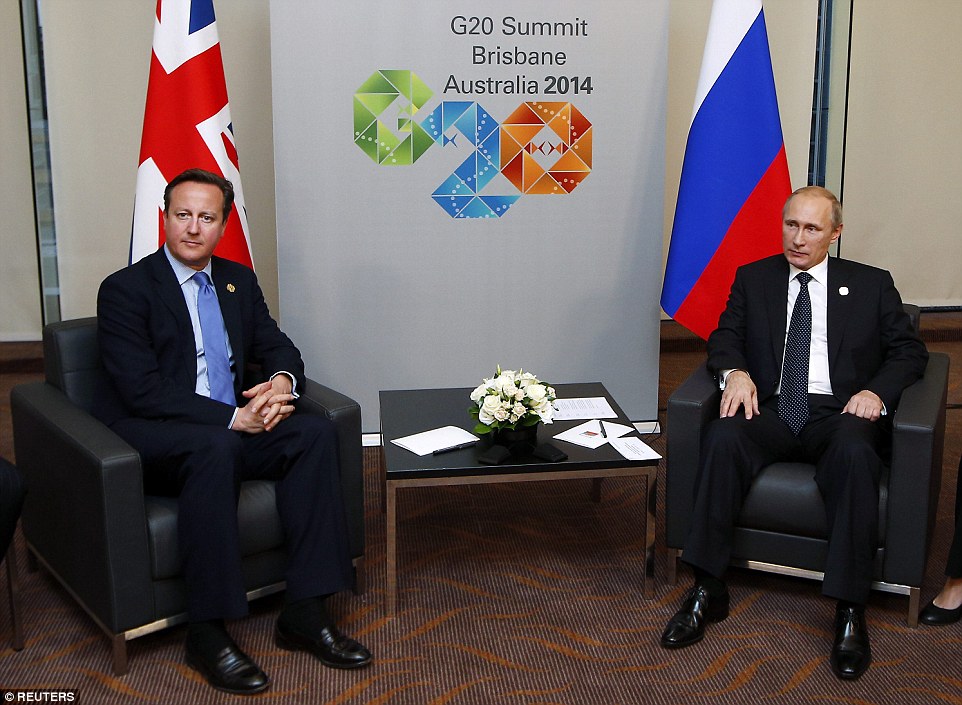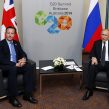
Putin Stonewalls, West Wobbles on Ukraine at G20 Summit
Publication: Eurasia Daily Monitor Volume: 11 Issue: 205
By:

G20 heads of state and government held their regular summit on November 15–16, in Brisbane, Australia. Within that large group, Western summiteers devoted much of their time to discussions with Russian President Vladimir Putin about Ukraine. This was a follow-up to the same Western leaders’ discussions with Putin during the recent Asia-Europe Meeting (ASEM) summit in Milan (see EDM, October 22). The formats differed radically, however.
In Brisbane, the main Western leaders held bilateral talks with Putin about Ukraine; whereas the Milan summit had featured a group discussion by the main European leaders with Putin on Ukraine. Going back to the Normandy and Wales summits in June and September, each successive summit marked radical innovations in rearranging the chairs with Putin. But they all failed to budge him on the problem at hand, which most Western leaders stop short of characterizing as Russia’s war against Ukraine. Although Russia has scuttled the armistice agreements (see accompanying article), no further economic sanctions on Russia were discussed at this summit.
German Chancellor Angela Merkel’s pre-eminence was the salient feature of discussions on Ukraine in Brisbane, as it had been at the Milan summit. Merkel held by far the longest tete-a-tete session with Putin in Brisbane; and she was the only one to hold bilateral talks with Putin in Milan, outside the group discussion. These are German initiatives, not favors bestowed by Putin on Berlin.
The German government has seized the lead role in the European Union’s policy on the Russia-Ukraine conflict. In Milan, Merkel had asked Putin to ensure the implementation of specific points in the Minsk armistice agreements. As Putin stonewalled, Merkel changed tack in Brisbane. She offered to support the establishment of direct relations between the EU and the Russia-led Customs Union/Eurasian Union, “for economic cooperation in the mutual interest.” This move would supposedly demonstrate for Putin that he has nothing to fear from the EU’s partnership with Ukraine (Die Welt, November 16).
This initiative has apparently been agreed on a bipartisan basis by the Christian-Democrat Chancellor with the Social-Democrat-led Ministry of Foreign Affairs. The minister, Frank-Walter Steinmeier, explains this proposal as “part of a search for new steps to defuse EU-Russia tensions.” While maintaining the economic sanctions on Russia for now, the initiative to hold a “meeting of those two organizations on an equal footing could relax EU-Russia relations” (Welt am Sonntag, November 16).
This initiative would certainly please the Kremlin (as those statements imply). Apart from its symbolic value, this move would, for the first time, suggest that Germany and/or the EU consider offering Russia some consolation prize for the economic sanctions.
Direct relations with the Eurasian Union would amount to EU recognition of that organization, casting Russia officially as a bloc leader. This is already implied in the argument that a meeting of these two organizations would be a gesture to Russia, not to Belarus or Kazakhstan. On the other hand, such a meeting (if held) would bring Belarus in from the cold, to an official (“equal footing”) meeting with the EU. This could be the unintended silver lining to such a meeting. However, Belarus would most likely want to be accepted as a state in its own right, not as an appendage to Russia via the Eurasian Union.
Canadian Prime Minister Steven Harper told Putin in Brisbane point-blank to remove Russian troops from Ukraine’s territory. Putin testily denied that Russian troops were there (Interfax, November 17). British Prime Minister David Cameron warned Putin that further destabilizing moves in Ukraine would result in further economic sanctions on Russia. Yet, Cameron welcomed Putin’s assurance that Ukraine should remain a “united political space” (RFE/RL, November 16). A “political space,” however, is not a state; instead it alludes to Russia’s proposals to “federalize” or “confederalize” Ukraine, implying partition in all but name. On October 24, at the Valdai Club meeting, Putin had argued yet again that Ukraine was a “composite state,” questioning its statehood (Interfax, October 24).
Western leaders concluded the Brisbane summit with a decision to not impose additional sanctions on Russia. Instead, European leaders at the summit reached a consensus to sanction the leaders of the secessionist Donetsk and Luhansk “republics” at an upcoming meeting of the EU. Thus, Putin could be justified in concluding that he retained some margin for incremental escalation of hostilities against Ukraine without further economic costs to Russia.




